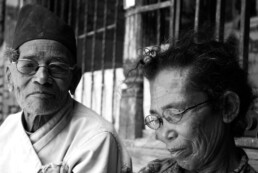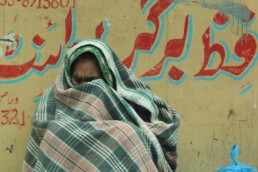Super Visas for Parents and Grandparents
Apply For A Super Visa For An Extended Visit With Family
If you are a Canadian citizen or permanent resident and you have parents or grandparents in another country, you can apply for them to visit you in Canada for an extended period of time. This special visitation visa is called a super visa—it lasts longer than six months—and can be applied for at Immigration, Refugees and Citizenship Canada (IRCC). If you need assistance with the super visa application, contact a local immigration and refugee law office—they can help to make sure your application meets all of the requirements.
One of the reasons that a Canadian woman may want her parents to visit is if she is expecting a child, so that her mother or father can be by her family’s side for the first year of her child’s life. This is a common request—Canadians and permanent residents want their parents close by, especially during special times in their lives. Super visas are also common for weddings, deaths in the family, or any other time when families need each other for emotional or physical support.
At the present time, most visitors to Canada may visit for up to six months when they first enter Canada, and they must apply for an extension, and pay a new fee if they intend to stay and visit longer. With the parent and grandparent super visa, however, eligible parents and grandparents can visit family in Canada for up to two years without the need to renew their status.
The Super Visa is a multi-entry visa providing multiple entries for a period up to 10 years. The main difference is that the Super Visa allows an individual to stay for up to two years on initial entry into Canada, while a 10-year multiple entry visa would only have a status period for each entry of six months only.
The main applicant requirements for a super visa include:
- Be a parent or grandparent of a Canadian citizen or permanent resident
- Be allowed entry into Canada
- Valid Canadian medical insurance for at least one year
- Immigration medical exam completed by a doctor on the list of panel physicians within the last twelve months
Presence of factors that demonstrate the applicant will voluntarily return home after the super visa expires: strong ties to home country, the purpose of the visit, family and financial situation, and overall economic and political stability of the home country.
The main sponsor requirements for a super visa include:
- A written statement describing your willingness to support the applicant financially
- Proof that you meet the minimum income threshold
- May be asked to provide a letter of invitation
- Pay the required fees and submit the required documents
For more information or assistance with visa applications, contact an immigration and refugee law office.
Refugee Law Offices Bridge the Gap
The Difference between “Safe” and “Unsafe” Countries of Origin
In his recent visit to Calgary, United Nations Secretary General Ban Ki Moon praised Canada for being generous and compassionate toward Syrian refugees. Ban also called on nations in the world to follow the Canadian example. Despite these plaudits, the Canadian refugee system is far from perfect.
One reform from the Protecting Canada’s Immigration System Act that is still controversial is that different procedures apply to refugee claimants depending on their nationality. The Minister of Immigration, Refugees and Citizenship Canada can designate countries based on their human rights record, and claimants from those countries suffer from a suite of procedural disadvantages. They were initially unable to appeal a negative decision, but the Federal Court found that provision was unconstitutional because it discriminated on the basis of national origin. Even now though, those same refugee claimants do not have as much time to prepare for their refugee hearings, they have to wait 180 days before they are eligible for a work permit, they can be removed from Canada while they apply for judicial review from the Federal Court, and they have to wait three times longer before they can apply for a pre-removal risk assessment.
One of the problems with this process is that the determination of which states respect human rights is not always that transparent or straightforward. There are also no statutory criteria for de-designating a country when conditions change. Hungary is one of the designated countries, for instance, and over 40% of claims from that country in the recent past were successful.
Another problem is that countries which are generally safe for most people may not be safe for particular minority groups, but there is no mechanism by which to exempt certain profiles from the procedural disadvantages of their country’s designation.
As well, the decision of which country is to be considered safe is made by the Minister of Immigration, Refugees and Citizenship and not a panel of experts. Such centralized decision-making makes the process potentially vulnerable to politicization, although the Trudeau government is generally more compassionate toward refugees.
At the time this bill was introduced, the government said that the rationale was to reduce abuse in the refugee system. Indeed, it was believed that by processing these applications faster, they would also reduce the workload by removing the “unfounded claims.”
Yet, the 65-year-old Refugee Convention makes no such distinction. According to the refugee convention, a refugee is “someone who is unable or unwilling to return to their country of origin owing to a well-founded fear of being persecuted for reasons of race, religion, nationality, membership of a particular social group, or political opinion.” Behind every refugee there is a story. Behind every refugee there are circumstances that force somebody to flee their home country. Refugee law offices work tirelessly to assist applicants throughout the process and record each story in its context.
As UN Secretary General Ban Ki Moon said in Calgary, Canada’s response to the Syrian crisis in relation to refugees is remarkable. Canada’s domestic policies, however, do not always satisfy its international obligations. The designation of countries narrows the meaning of who is an acceptable refugee and who is not based primarily on a distinction that the Federal Court has already said is discriminatory.
Other reforms in the refugee system are yet to be fully seen and tested. At this point, refugee law offices are doing all they can to help refugees with their applications and assist them throughout the process.
Makeover for Immigration Detention In Canada
Canadian Government Pledges $138 Million To Upgrade Immigration Detention Centers And Increase Availability Of Alternatives To Detention
Canada’s Public Safety Minister, Ralph Goodale, stated on August 15, 2016, that the federal government will invest $138 million to reform the current immigration detention system by upgrading detention centers and increasing availability of alternatives to detention. The Minister stated that the government’s objective with the reform is to make immigration detention a means of last resort.
As part of the makeover, the federal government aims to reduce using jails to hold immigration detainees, as well as avoiding the detention of minors. Other reform objectives include exploring alternatives to detention such as supervision and surveillance, improving the physical and mental health care offered to detainees, and increasing transparency.
The government’s plan to reform Canada’s immigration detention comes after heavy criticism of the system over the past few years. Immigration and refugee lawyers, human rights groups, and agencies such as the Red Cross have expressed concern over the human rights violations and substandard treatment faced by detainees in immigration custody. Detention centers are currently plagued with overcrowding, inadequate mental health care, and intermingling with the criminal population if detainees are placed in provincial jails. Over the last decade, at least fifteen individuals have also died in immigration custody, including 3 deaths this year alone. Minister Goodale stated that the proposed reform is meant to address these problems and concerns.
In light of the scrutiny faced by Canada’s immigration system, both domestically and internationally, Minister’s Goodale’s announcement could not arguably have come at a better time. In a recent interview, with CBC for a news story, Ms. Arghavan Gerami of Gerami Law PC stated that she is happy to see the federal government allocate funding to address problems with detention. She has handled several dozen cases involving immigration detainees and hopes to finally see changes in how people are treated. She does not want to see the allocated funding be used just to improve and expand the CBSA detention centers. Instead, she hopes the funding goes to support services like mental health, with an emphasis on alternatives to detention.
Some of the Canada’s immigration lawyers share these views on to how the new funding will be used, arguing that overhauling the system should aim at keeping people out of detention, not building new detention centers and beds. As the federal government begins to implement the reform, it will remain to be seen as to whether these reservations are warranted or whether immigration detention practices in Canada will finally see a much-needed and long-overdue transformation.
Immigration Delays Cause Stress and Uncertainty
Canadian concerned for family’s safety while waiting to hear about immigration status
Immigration delays are far too common, and cause stress for both the sponsors and the families involved—especially if those affected are refugees fleeing from dangerous countries. Canadian immigration lawyers can help families immigrate and reunite in Canada. Here is an account of one Canadian man who has been trying to get his family to Canada for the past three years:
According to a recent CBC News article, a Moncton man has been trying to get information on the immigration status of his family in Lebanon, but has yet to hear anything from the Canadian government. Elian Elias is a successful Canadian businessman who immigrated to Canada from Syria in 2010. Elias has been trying to get the rest of his family to Canada for the past three years, but he hasn’t heard anything from Citizenship and Immigration Canada regarding the status of his application.
With his Canadian citizenship, and his ability to sponsor and employ his family once they arrive in Canada, Elias is frustrated that the immigration process is taking so long. He is concerned for his family’s safety in Lebanon, especially since they don’t have jobs.
It took Elias months to complete the application process because he wasn’t receiving any response from the Canadian embassy in Lebanon. Elias had to contact the International Organization for Migration (IOM) in Lebanon to finally get the application moving. The IOM helps immigrants, like Elias’s family, to complete the immigration application, which includes completing interviews and medical exams. His mother-in-law is awaiting official confirmation for her approved application status, but his brother still hasn’t heard anything. If his brother doesn’t get approved, then his brother’s wife and five-month old son could be separated from his brother if they get approved immigration status.
The hardships families face when separated are difficult enough. But not being able to reunite with family—especially when the resources are available—due to delays and red tape is frustrating and needs to be fixed. Immigration lawyers in Canada are able to give refugee families a voice when their own voice isn’t being heard. Immigration lawyers are well-versed in the delays and their causes that many people face during the lengthy immigration process.
Three years is a long time to wait to hear whether or not your family is coming to Canada. Being expected to wait that long (and longer) is also being expected to worry for that long—to worry whether your family has shelter, is getting enough to eat, and is safe from threats.
755 Immigrants for Express Entry to Canada
For Skilled Immigrants Coming To Canada For Economic Opportunity, The Government Invites You To Apply Via Their Express Entry Pool
The Department of Immigration, Refugees and Citizenship Canada (IRCC) has issued an invitation to 755 eligible candidates to apply for permanent residence in Canada, according to Canada Visa’s Immigration News. These candidates were drawn from the Express Entry Pool on July 27th, 2016. Successful applications will grant permanent residency to the primary applicant along with their spouse, common-law partner, and/or dependent children.
What Is Express Entry?
The Express Entry system was first introduced to Canada on January 1st, 2015 by the Conservative government. It is an immigration management system that classifies hopeful economic immigrants in one of three categories:
- Federal Skilled Worker;
- Federal Skilled Trades; and
- Canadian Experience Class.
Eligible candidates submit profiles to the Express Entry pool and are ranked through a points system called the Comprehensive Ranking System (CRS). Those applications are then prioritized according to the points system, with the highest-scoring candidates prioritized for application whenever the government performs a draw from the pool.
Permanent Residency Invitations
The number of invitations issued whenever a draw is made by the government varies, generally ranging from 1,100 to 1,600 invitations per draw. Draws are made frequently, with 23 draws from 2015 that resulted in 47,851 invitations for permanent residency applications through Express Entry. At least one draw has occurred every month since the program was first implemented.
CRS: What Do I Get Points For?
Points are granted based on age, level of education, language ability in French or English, and Canadian work experience. If the applicant has a spouse, the points are calculated differently: maximum number of points may or may not be achieved, and the spouse’s age, education level, language ability, and Canadian work experience can contribute to the total number of points granted to the applicant. Applicants can also get 600 additional points through a job offer (approved through a Labour Market Impact Assessment) or a Provincial Nomination through the Ontario Provincial Nominee Program.
After The Application
Those invited to apply through the Express Entry Pool have 30 days to complete their application. Once the application has complete, the Canadian government aims to process the application within six months. However, at that second stage permanent residency application will also be assessed for admissibility (such as medical and criminal admissibility) and Applicants will definitely benefit from the assistance of a Canadian Immigration Lawyer to ensure they meet all the relevant requirements.
How do I apply?
If you are looking to immigrate to Canada for better economic opportunities, you can create a free Express Entry profile online. Visit the Government of Canada’s website for more information, or visit this F.A.Q. page to answer some common questions you may have on immigration.





